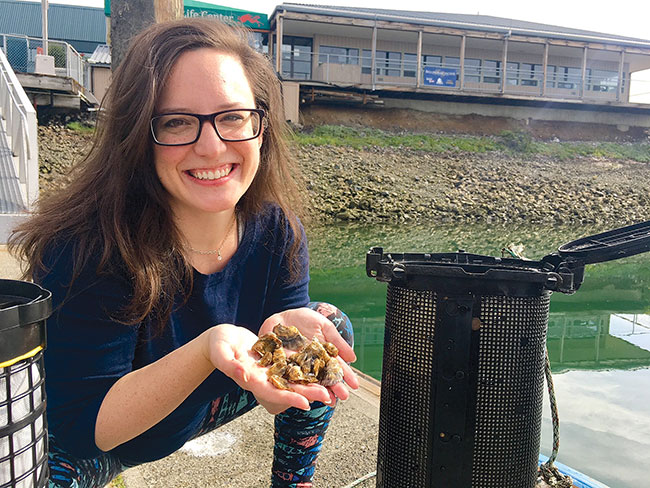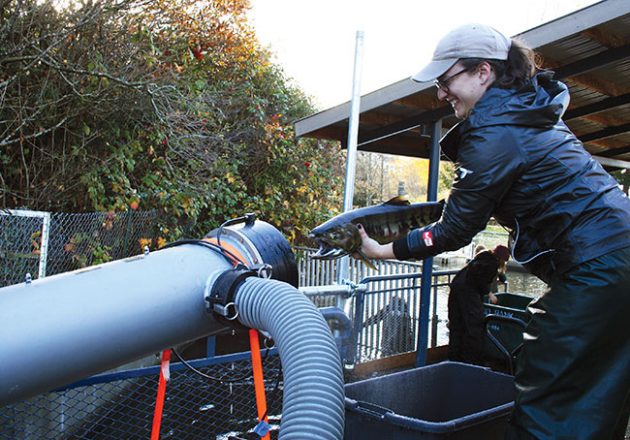
Top 10 Under 40
Business Management
Disease Management
Fish Health
Profiles
Sustainability
Brittany Palm-Flawd: Teach them how to fish
October 9, 2019 By Mari-Len De Guzman
 Brittany Palm-Flawd, hatchery manager at Bellingham Technical College’s Whatcom Creek Hatchery in Washington State, USA
Brittany Palm-Flawd, hatchery manager at Bellingham Technical College’s Whatcom Creek Hatchery in Washington State, USA Book smarts and street smarts. These two skills embody the professional work of Brittany Palm-Flawd.
Palm-Flawd grew up in a fishing community in Long Island, New York. Even as a kid, she already exhibited a keen interest in marine life. In middle school, she volunteered at a shellfish hatchery and “haven’t looked back since.” She has worked on mussel farms, fjord net pens, groundfish trawlers, longline vessels, salmon hatcheries, and in marine and freshwater habitat restoration. She has a bachelor’s degree in Marine Biology and a master’s in Marine Science. She is a certified instructor in Washington State, a former Fullbright Scholar in Ireland and former Canadian NSERC Scholar.
“(These have) given Brittany a deep bench of experience and a global perspective that is useful in helping to advance the industry,” Michael Messina writes about the hatchery manager at Bellingham Technical College’s (BTC) Whatcom Creek Hatchery in Washington State. BTC’s Whatcom Creek Hatchery is operated in partnership with the Washington Department of Fish and Wildlife and under co-management with the Lummi Nation.
“On top of all that Brittany undertakes as a hatchery manager, college instructor and PhD candidate, she took on a two-year, one-million production increase in response to the state governor’s request to increase Chinook for starving orca,” Messina adds.
Palm-Flawd’s response to this natural crisis and the manner in which she undertook the challenge is noteworthy, not only for the leadership qualities she demonstrated in leading her students through this initiative, but also for her constant quest to advance sustainability and environmental responsibility.

Everything she does in her work is “through the lens of sustainability,” according to Messina. For example, she recently conducted a trial of alternative methods of production, including multi-tropic farming with aquaponics. She is also working to expand training methods in algae and shellfish production, making BTC’s hatchery training program the only two-year program on the U.S. West Coast that trains in aquatic invertebrate hatchery technology.
“Whether you are raising algae, oysters, or salmon, there are many challenging and rewarding experiences, especially when you focus on sustainable methods that reduce environmental impacts and breeding programs that produce a high-quality product,” Palm-Flawd says.
“At the end of the day, it’s all about sustainable seafood and how these industries will continue to feed a growing global population.”
The young hatchery manager is also not afraid to embrace innovation, says Messina, who is a corporate innovation partner with Whooshh Innovations. Palm-Flawd is working with Whooshh to gather data to help with the development of machine learning algorithms used in scanning systems for improved passage, data collection and invasive species management. She gets her students involved with the technology, as well, training them on the company’s fish transport and visual recognition software.
In addition to her hatchery duties, Palm-Flawd takes pride in her work training future hatchery professionals as an instructor at BTC. This year the school’s hatchery training program is celebrating its 40th year. She especially feels passionate about her work as an instructor as she recognizes the lack of training opportunities as one of the biggest challenges for the hatchery sector.
“Throughout my career, I have always asked others how they got started in the business and for a lot of people, they kind of ‘fell’ into the work and learned on the job,” she explains. “I believe a large movement has begun in expanding more formal education and internship programs to support the next generation of this industry, particularly in hatchery technology. This industry is growing rapidly and needs a highly trained workforce to support it.”
She proudly declares that recent graduates of the hatchery training program at BTC have had an employment rate of nearly 90 per cent.
Her advice to young people interested in the aquaculture industry: “Try everything to find your passion!”
Print this page





